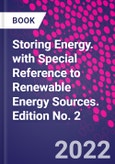Storing Energy: With Special Reference to Renewable Energy Sources, Second Edition has been fully revised and substantially extended to provide up-to-date and essential discussion that will support the needs of the world's future energy and climate change policies. New sections cover thermal energy storage, tidal storage, sustainability issues in relation to storing energy and impacts on global energy markets. Various systems are discussed, including mechanical/kinetic, thermal, electrochemical and other chemical, as well as other emerging technologies.
Incorporating advancements described in the book will help the people of the world further overcome the problems related to future energy and climate change.
Please Note: This is an On Demand product, delivery may take up to 11 working days after payment has been received.
Table of Contents
A. INTRODUCTION
1.The Role of Energy Storage in Low-Carbon Energy Systems
B. ELECTRICAL ENERGY STORAGE TECHNIQUES GRAVITATIONAL/ MECHANICAL / THERMOMECHANICAL
2. Pumped Hydro-electricity
3. Novel Hydroelectric Storage Concepts
4. Advance Rail Energy Storage (ARES)
5. Compressed Air Energy Storage (CAES) in Underground Formations
6. Compressed Air Energy Storage (CAES) with Underground Storage
7 Compressed Air Energy Storage (CAES) with Undersea Bags
8. Pumped Hydro Combined with Compressed Air
9. Liquid Air Energy Storage: (LAES)
10. Flywheels
11. Rechargeable Batteries
12. The Vanadium� Redox� Flow Batteries Thermal
13. Phase Changes
14. Solar Ponds
15. Sensible Thermal Energy Storage: Diurnal and Seasonal Chemical
16. Hydrogen from Water Electrolysis
17. Chemical Reactions
18. Power to Gas
19. Traditional Energy Storage: natural gas, oil and coal�
20. Large Scale Hydrogen Storage
C. INTEGRATION
21. Network Integration and Smart Grids
22. Off-Grid Energy Storage
D. INTERNATIONAL ISSUES AND THE POLITICS OF INTRODUCING RENEWABLE ENERGY SCHEMES
23. Energy Storage World-Wide
24. Energy Storage in China
25. Politics of Investing in Renewable Energy Systems
26. Pumped Thermal Energy
27. Betavoltaic Devices for Small
28. Batteries (Diamond Plus C14 Graphite)
29. Superconducting Magnets
30. Supercapitors
31. Harvesting Energy from Car Tyres (Friction)
32. Concentrated Solar Energy and Co2 + H2o Catalysed to Liquid Fuel
33. Tidal Storage
34. Molten Salts
35. New Types of Batteries
36. Sustainability Issues in Storing Energy
37. Energy Markets for Storing Energy around the World








